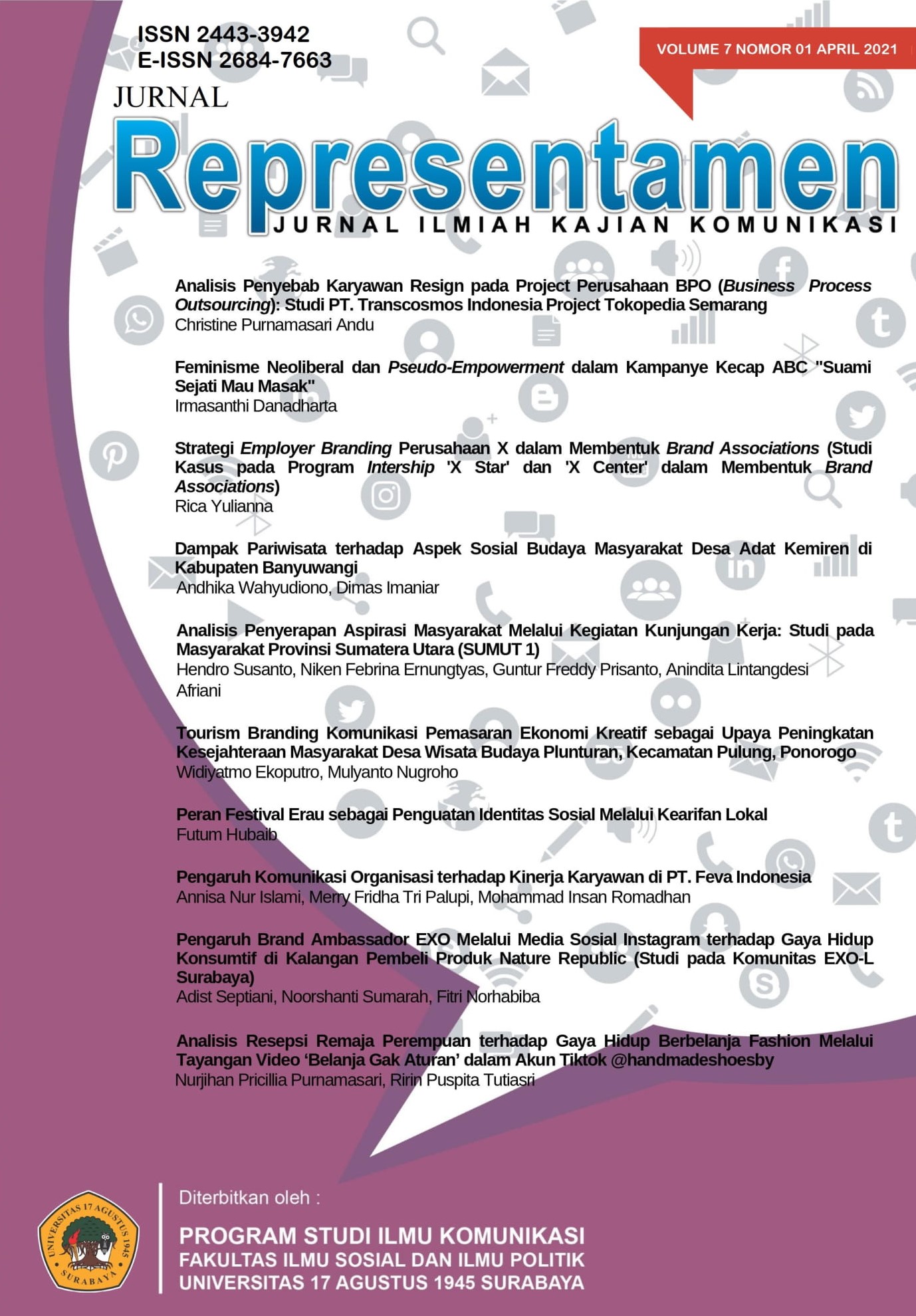Analisis Penyerapan Aspirasi Masyarakat Melalui Kegiatan Kunjungan Kerja: Studi pada Masyarakat Provinsi Sumatera Utara (SUMUT 1)
DOI:
https://doi.org/10.30996/representamen.v7i01.5124Abstract
The working visit or recess of the DPR RI is carried out to realize the aspirations of the right people on target to achieve political goals. This activity is also inseparable from the things considering that it follows local government policies and the DPRD to be said to be a successful activity. The purpose of this study was to analyze the aspiration absorption strategy through recess activities. This research method uses a qualitative-descriptive approach with in-depth interviews with three informants, namely members of the Indonesian Parliament and representatives of the electoral district of North Sumatra 1. The study results state that the strategy for absorbing people's aspirations is carried out through various forms of aspiration by involving community groups. The main structure of a method for capturing aspirations is through face-to-face dialogue with communities. People's aspirations were complete when they had felt the benefits directly.
Keywords: community aspirations, political communication, recess, communication strategy
Downloads
References
Adianto, Adianto; As’ari, H. (2016). PERAN DPRD DALAM MEMBANGUN PARTISIPASI MASYARAKAT DI KABUPATEN KEPULAUAN MERANTI. PUBLIKa, 2(1), 30–47.
Amiruddin. (2003). Draf tatib pilgub yang kompromistis. Retrieved from suaramerdeka.com
Bryant, C., & White, L. G. (1987). Manajemen Pembangunan untuk Negara-Negara Berkembang. Jakarta: LP3ES.
Burhan, B. (2007). Penelitian Kualitatif: Komunikasi, Ekonomi, Kebijakan Publik dan Ilmu Sosial Lainnya. Jakarta, Indonesia: Putra Grafika.
Dwiyanto, A. (2003). Reformasi Tata Pemerintahan dan Otonomi Daerah. Yogyakarta: Pusat Studi Kependudukan dan Kebijaka UGM.
Fadhil, H., Terpopuler, B., Ini, W., Uang, G., & Bank, N. (2020). DPRD Geram Jalan Rusak Parah di Medan Padahal APBD Besar.
Firmanzah. (2012). Marketing Politik Antara Pemahaman dan Realitas. Jakarta: Yayasan Pustaka Obor Indonesia.
Gaffar, A. (1992). Javanese Voters: A Case Study of Election Under a Hegemonic Party System. Yogyakarta: Gadjah Mada University Press.
Hidayatullah, H., & Pribadi, U. (2016). Analisis Jaring Aspirasi Melaui Reses Dewan Perwakilan Rakyat Daerah Lombok Timur Tahun 2015. Journal of Governance and Public Policy, 3(2), 339–367. https://doi.org/10.18196/jgpp.2016.0062
Marzuki. (2005). Metodologi Riset Panduan Penelitian Bidang Bisnis dan Sosial Edisi Kedua . Yogyakarta, Indonesia: Ekosiana.
Muhtadi, A. S. (2008). Komunikasi Politik Indonesia. Bandung: PT Remaja Rosdakarya.
Nasution, A. (2019). Akhyar : Tiga Masalah Klasik di Medan.
Patilima, H. (2007). Metode Penelitian Kualitatif. Bandung, Indonesia: Alfabeta.
Pawito. (2007). Penelitian Komunikasi Kualitatif. Yogyakarta: LkiS.
Pureklolon, T. T. (2016). Komunikasi Politik. Jakarta, Jakarta Pusat, Indonesian: Gramedia Pustaka Utama.
Purwoko. (2008). Memahami Aspirasi Rakyat. Retrieved from http://www.bpurwoko.staff.ugm.ac.id/2008/09/25memahami-aspirasi-rakyat
Raco, J. R. (2010). Metode Penelitian Kualitatif: Jenis, Karakter, dan Keunggulannya. Jakarta: Grasindo.
Setiawan, B., Alfian, M., & Widoyoko, S. E. P. (2013). Model Penjaringan Aspirasi Masyarakat Sebagai Upaya Peningkatan Kinerja Anggota Dprd. Sosiohumaniora, 15(2), 151. https://doi.org/10.24198/sosiohumaniora.v15i2.5741
Utomo, E. P., & Hafied Cangara, M. I. S. (2013). Strategi Komunikasi Dalam Menyerap Aspirasi Masyarakat Adat Oleh Anggota Dprd Kabupaten Teluk Bintuni Provinsi Papua Barat. Jurnal Komunikasi KAREBA, 2(4), 351–360.
Wasistiono, S., & Wiyoso, Y. (2009). Meningkatkan Kinerja Dewan Perwakilan Rakyat Daerah (DPRD). Bandung: Fokusmedia.
Zuhriansyah, M. (2013). PENYERAPAN ASPIRASI MASYARAKAT DALAM ANGGARAN PENDAPATAN DAN BELANJA DAERAH PADA DINAS CIPTA KARYA, PERMUKIMAN DAN PERUMAHAN. Jurnal Ilmu Politik Dan Pemerintahan Lokal, II(2), 311–319.
Downloads
Published
Issue
Section
License
Authors whose manuscript is published will approve the following provisions:
The right to publication of all journal material published on the jurnal representamen website is held by the editorial board with the author's knowledge (moral rights remain the property of the author).
The formal legal provisions for access to digital articles of this electronic journal are subject to the terms of the Creative Commons Attribution-ShareAlike (CC BY-SA) license, which means Jurnal Representamen reserves the right to store, modify the format, administer in database, maintain and publish articles without requesting permission from the Author as long as it keeps the Author's name as the owner of Copyright.
Printed and electronic published manuscripts are open access for educational, research and library purposes. In addition to these objectives, the editorial board shall not be liable for violations of copyright law.











